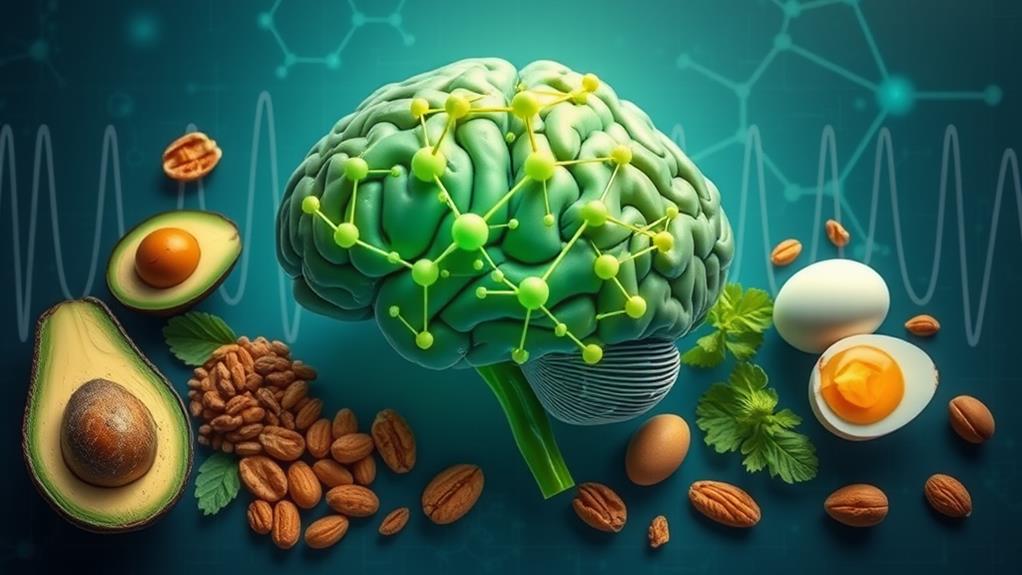
Think the keto diet is all about cutting out carbs and eating a mountain of bacon? Let's set the record straight! The keto diet doesn't mean you'll miss out on essential nutrients or sabotage your heart health. In fact, people enjoy loads of vitamins and minerals from low-carb veggies and meats. Science shows that fats aren't the bad guys; they actually help you burn fat more efficiently and keep your blood sugar steady. Plus, don't worry about your brain – those ketones can boost mental clarity. So, if you're curious about more keto facts, get ready to be surprised!
Key Takeaways
- Recent studies debunk the myth that saturated fat in keto diets leads to heart disease, showing no strong connection.
- Keto diets do not lead to nutrient deficiencies when properly planned with meat and low-carb vegetables.
- Fat adaptation in keto allows for effective endurance performance without carbohydrates.
- Keto diets provide stable energy and enhanced cognitive performance through the production of ketones.
- Keto diets improve digestive health by increasing non-starchy vegetable intake and supporting gut microbiota diversity.
Carbs Are Essential
The belief that carbohydrates are necessary for human health is a common misconception. Many people think they need carbs to stay healthy, but that's just one of the many carbohydrate myths floating around. Our bodies can actually produce glucose through a process called gluconeogenesis, so dietary carbs aren't required.
Instead, we store about 500 grams of glycogen in our muscles and liver, which helps regulate our blood sugar levels without needing to eat carbs.
Interestingly, fat and protein are the only two macronutrients that are truly indispensable for our health. Fat, for instance, is important because it helps us absorb essential fat-soluble vitamins. Plus, research shows that people can effectively fuel their bodies and keep their energy up by using fat as their main energy source instead of carbs. This gives us a lot of dietary flexibility.
Low-carb diets, including the popular ketogenic diet, provide all the nutrients we need through foods like meat and low-carb veggies. These diets often offer more vitamins and minerals than high-carb diets!
Eating Fat Makes You Fat
Many people think eating fat makes you fat, but that's not the full story.
It's really insulin, triggered by carbs, that tells your body to store fat.
When you eat a lot of carbs, your blood sugar spikes, insulin comes to the rescue, and boom—fat gets stored.
Insulin's Role in Fat Storage
Contrary to the common belief that eating fat inevitably leads to weight gain, understanding insulin's role in fat storage reveals a more nuanced reality.
Insulin sensitivity plays an essential part in how our body handles fat metabolism. Higher levels of insulin, typically triggered by carbohydrate intake, lead to increased fat storage. When we eat carbs, our blood sugar spikes, prompting the body to release more insulin. This excess sugar then gets stored as fat.
Interestingly, dietary fat has a minimal impact on insulin levels. This means that fats can often be used as an energy source rather than being stored. When we lower carbohydrate intake, insulin levels drop, making it easier for our body to burn stored fat for energy.
Research shows that high-carb diets contribute to more significant fat accumulation. In contrast, low-carb diets help keep insulin levels low and promote fat oxidation.
So, while it might seem logical to think that eating fat makes you fat, the science tells us that the real culprit is high insulin levels driven by carbs, not fats.
This understanding can help us make better dietary choices and debunk the myth that all fats are bad for weight management.
Impact of Macronutrients on Insulin
Understanding insulin's pivotal role in fat storage naturally leads us to examine how different macronutrients impact insulin levels. When we eat carbs, our blood sugar spikes, and our bodies release a lot of insulin. This hormone tells our bodies to store fat, especially after those high-carb meals. It's like insulin is a fat-storing superhero—but not necessarily the kind we want, right?
On the flip side, fats and proteins don't make insulin go into overdrive. Carbohydrates stimulate a bigger insulin response, making them the main culprits in the fat storage process. This is why carbohydrate timing matters. If you eat a lot of carbs at once, your insulin goes up, and so does your fat storage.
Dietary fat, however, has a minimal effect on insulin. Lower insulin levels, achieved through a low-carb diet, help your body use stored fat for energy. So, less insulin means more fat burning.
Research shows that high-carb meals lead to more insulin release, while fats don't trigger the same response. So, the idea that eating fat makes you fat? Totally busted. Instead, focusing on insulin sensitivity and smart carbohydrate timing can make all the difference.
Dietary Fat and Heart Disease
Many people still think eating a lot of fat will give you heart disease, but that's not always true.
Scientists have found that some of Ancel Keys' research from the 1950s was flawed and recent studies show no strong link between saturated fat and heart disease.
It's still important to check your cholesterol levels, but the old fears about dietary fat might be based on outdated science.
Historical Misconceptions Persist
For decades, the dietary guidelines that shaped public health policies were heavily influenced by Ancel Keys' 1950s research, which suggested a direct link between saturated fat intake and heart disease.
This research led to the widespread belief that eating foods high in saturated fat would clog your arteries and lead to heart attacks.
But guess what? It turns out that might not be the whole story.
Ancel Keys' study has been criticized over the years for using flawed methods and selective data.
Critics argue that he cherry-picked data to fit his hypothesis, leaving out countries that didn't support his theory.
Recent meta-analyses, which are like super-studies that combine lots of research, have found no significant connection between saturated fat consumption and heart disease risk.
Surprising, right?
In fact, some studies have shown that higher saturated fat intake might actually be linked to lower stroke rates, especially in Japanese men.
So, while it's still important to keep an eye on your cholesterol levels, many of the old beliefs about fat and heart disease are now seen as outdated.
Modern science just doesn't back them up anymore.
Meta-Analysis Findings
Recent meta-analyses have fundamentally challenged the long-standing belief that saturated fat intake is directly linked to heart disease.
These findings shake up what many thought was true about the relationship between dietary fat and heart health.
Here are three key insights:
- No Significant Link: Recent studies show no significant connection between saturated fat and heart disease risk. This means that eating foods high in saturated fat doesn't necessarily increase your chances of heart problems as once believed.
- Lower Stroke Rates: Curiously, populations like Japanese men, who consume higher amounts of saturated fat, have been found to have lower stroke rates. This surprising finding questions the idea that all fats are harmful.
- Ancel Keys' Research Revisited: The famous 1950s study by Ancel Keys, which claimed a link between saturated fat and heart disease, has been criticized for its flaws.
Later research has not supported his conclusions, prompting a re-evaluation of dietary guidelines.
This new understanding suggests that saturated fat isn't the villain it's been made out to be.
However, while these findings are promising, it's still important to make balanced dietary choices.
The evolving science keeps us on our toes and reminds us that nutrition is a complex field.
Cholesterol Level Monitoring
How should individuals on a ketogenic diet approach cholesterol level monitoring, given the evolving understanding of dietary fats and heart disease? Recent meta-analyses have debunked the long-held belief that saturated fats are the villains behind heart disease. Notably, higher saturated fat consumption has been linked to lower stroke rates in some populations, like Japanese men. This challenges the outdated findings from the 1950s research by Ancel Keys, which has been criticized for its flawed methods and selective data.
Even so, cholesterol management remains vital for those on a ketogenic diet. Dietary changes can cause cholesterol levels to fluctuate, so keeping an eye on these levels is wise. Fortunately, current research indicates that well-formulated ketogenic diets can actually improve heart health markers. Many people on keto see a drop in triglycerides and a rise in HDL cholesterol, which is the "good" kind.
Here's a quick look at the evolving understanding of dietary fats and cholesterol management:
| Aspect | Insight |
|---|---|
| Saturated Fat and Heart Disease | No significant link found in recent studies |
| Stroke Rates in Populations | Higher fat intake linked to lower stroke rates in Japanese men |
| Ancel Keys' Research Critique | Criticized for flawed methodology and selective data interpretation |
| Keto Diet Benefits | Improved cardiovascular markers, lower triglycerides, higher HDL cholesterol |
Nutrient Deficiencies on Keto
Contrary to widespread misconceptions, a well-formulated ketogenic diet can effectively sidestep nutrient deficiencies and even surpass the nutrient density of typical high-carb diets. For example, spinach provides twice the potassium content of a banana, emphasizing the nutrient density of keto-friendly foods.
By focusing on proper food selection and meal planning, you can guarantee that all essential vitamins and minerals are met.
Key Points to Remember:
- Nutrient Absorption and Vitamin Sources: Keto diets often provide more micronutrients through meat and low-carb vegetables. These foods offer rich vitamin sources, guaranteeing better nutrient absorption compared to high-carb diets that may contain anti-nutrients.
- Mineral Balance and Deficiency Symptoms: With the right meal planning and nutrient timing, you can maintain a good mineral balance. Spinach and other leafy greens are excellent keto-friendly options to prevent deficiency symptoms like muscle cramps and fatigue.
- Supplementation Strategies: While whole foods should be your primary nutrient source, sometimes supplementation is necessary. Consider adding magnesium, potassium, and vitamin D to your regimen if you notice any signs of deficiency.
With careful planning and the right food choices, you can thrive on a keto diet without worrying about nutrient deficiencies.
Carbs for Exercise

While ensuring nutrient sufficiency is paramount on a ketogenic diet, another common concern revolves around carbohydrate intake for exercise performance. People often think you need carbs for the best exercise results, but science says fat can do the job just fine.
Dr. Stephen Phinney's studies showed that folks on a keto diet can still rock endurance exercises. They keep up their performance metrics even without carb timing.
In one study, some obese individuals improved their treadmill runs after just six weeks on keto. This proves that fat adaptation can actually boost your exercise game. Imagine that!
And it's not just one-off cases either. Cyclists in another research project kept their performance levels steady without munching on carbs. Their bodies learned to use fat for energy during tough workouts.
Fat adaptation means athletes can tap into their body's fat stores for fuel. This can cut down the need for carbs during exercise.
Carbs for Muscle Building
Many people think you need a lot of carbs to build muscle, but that's not true.
Protein, especially the amino acid leucine, is key to muscle growth, and resistance training is essential too.
Studies show that even on a low-carb diet, you can still gain muscle as long as you get enough protein and keep working out.
Protein's Role in Muscle
A common misconception in the domain of fitness and nutrition is the presumed necessity of high carbohydrate intake for muscle building. Many believe that without carbs, muscle gain is impossible, but science tells a different story. Protein synthesis and muscle recovery are actually the key players here.
- Insulin and Muscle Gain: Insulin helps muscle gain, but you don't need tons of carbs for this. What you do need is enough protein, especially leucine, which is crucial for muscle synthesis.
- Resistance Training: Want to build muscle? Lift weights. Studies show that resistance training is essential for muscle growth, even on low-carb diets. Protein and strength training go hand in hand.
- Keto Diet Success: Surprising but true—people can gain muscle on a ketogenic diet. Research highlights that with enough protein and proper strength training, muscle growth is achievable without carbs.
Energy Sources for Workouts
The debate surrounding ideal energy sources for workouts often invokes the traditional belief that carbohydrates are indispensable for peak exercise performance.
But what if this isn't entirely true? Research indicates fat can be an effective fuel, especially for those who are fat-adapted. Dr. Stephen Phinney's studies show that even obese individuals on a ketogenic diet performed better on endurance tests. This suggests a low-carb approach doesn't hinder exercise capability.
Take cyclists, for example. In trials, they maintained high performance levels without carbohydrate intake, proving that glycogen stores aren't the only energy source during intense physical activity. This blows the carb-only theory out of the water!
Now, let's talk muscle building. Insulin is vital, but did you know sufficient protein, especially leucine, along with resistance training, is essential for muscle growth regardless of carbs?
Evidence even supports increased muscle synthesis on low-carb, moderate protein diets. This challenges the idea that high carbohydrate intake is necessary for muscle building.
Long-term Safety of Keto

Grappling with the question of long-term safety for the ketogenic diet reveals both promising insights and areas requiring further investigation. Understanding keto adaptation and its long term effects is essential to weigh the pros and cons.
Historical examples, like the traditional Inuit diet, show that people can thrive on low-carb regimens for centuries. However, modern scientific data on long-term effects is still somewhat sparse.
Medium-term studies, such as those conducted by Virta Health, provide encouraging evidence. Participants experienced notable health improvements, including better body weight, blood pressure, and blood sugar control.
Here are some key findings:
- Diabetes Reversal: About 60% of participants in the Continuous Care Intervention (CCI) reversed their diabetes within a year.
- Cardiovascular Health: Improvements were seen in 22 out of 26 cardiovascular risk factors among CCI participants.
- Sustained Benefits: Current studies suggest that the ketogenic diet can be effective and beneficial for many people over time.
Despite these promising results, more research is needed to fully understand the long-term safety of the ketogenic diet.
Until then, the evidence so far indicates that with proper management and medical supervision, it can offer significant health benefits.
Keto and Mental Health
Examining the long-term safety of the ketogenic diet naturally leads to questions about its impact on mental health. Many wonder if cutting carbs might mess with their minds. But guess what? Science says otherwise!
A study looked at people's mood and psychological wellbeing over two years. It found no big differences between those on low carb diets and those on traditional diets. Both groups felt better mentally!
One reason for this might be weight loss. Losing weight helped everyone feel less down and more upbeat. Plus, keto benefits include better blood sugar control. When your blood sugar isn't bouncing around like a yo-yo, your mood stays more stable too. That's a win-win!
And here's the kicker: folks on keto often report increased energy levels and enhanced mental clarity. Imagine feeling like your brain just got a tune-up! This totally busts the myth that low carb diets make you sluggish or foggy.
Keto Enhances Athletic Performance

Shattering the conventional wisdom that carbohydrates are essential for peak athletic performance, recent research reveals that a ketogenic diet can effectively fuel high-level exercise.
Dr. Stephen Phinney's studies suggest that fat metabolism can sustain athletic performance just as well, if not better, than carbs. This revelation is particularly significant for endurance athletes.
Key Points:
1. Endurance Benefits: Athletes on a keto diet have demonstrated high performance in endurance activities, such as cycling, even without carbohydrate intake.
This suggests that fat adaptation allows for efficient energy use during prolonged physical activity.
2. Improved Exercise Capacity: Remarkably, obese individuals showed enhanced treadmill performance after only six weeks on a ketogenic diet.
This highlights the diet's potential to boost exercise capacity, making it a viable option for improving athletic performance.
3. Increased Energy and Mental Clarity: Athletes in a ketogenic state often report heightened energy levels and sharper mental focus.
These benefits contribute positively to their overall performance, both during training sessions and competitive events.
Keto and Digestive Health
Many people mistakenly believe that a ketogenic diet inherently causes digestive issues. However, this isn't necessarily true. In fact, many people on keto report better digestive health. This improvement often comes from eating more non-starchy vegetables, which are rich in fiber.
Fiber is vital for a healthy gut, and with thoughtful meal planning, you can get plenty of it even on a low-carb diet.
Another important aspect is probiotics. These good bacteria help keep your gut healthy and can reduce any digestive discomfort you might feel when starting keto.
Studies even show that a keto diet can improve gut microbiota diversity, which is essential for overall digestive health. This digestive diversity is one of the keto benefits that often gets overlooked.
Moreover, reducing carbs can help manage insulin resistance, which is often linked to digestive issues.
Keto and Cognitive Function

In addition to the benefits for digestive health, the ketogenic diet has garnered attention for its potential positive effects on cognitive function. Many people are curious about how ketosis impacts the brain. Here's what the science says:
- Stable Energy for the Brain: When you're in ketosis, your body produces ketones, which act as an alternative fuel source for the brain. This can lead to more stable energy levels and may enhance cognitive performance. Imagine having a steady flow of mental energy—like a well-oiled machine!
- Improved Mental Clarity: Some studies have shown that individuals on a ketogenic diet report increased mental clarity and focus. This counters the myth that low-carb diets cause brain fog. In fact, once you adapt to ketosis, you might feel sharper and more focused than before.
- Neuroprotective Benefits: There is evidence suggesting that ketogenic diets might have neuroprotective effects. This could be particularly beneficial for conditions like Alzheimer's and Parkinson's disease. Though more research is needed, the potential here is promising.
In addition, people on ketogenic diets have also reported improvements in mood and reductions in depression symptoms.
Frequently Asked Questions
Is Keto Scientifically Proven?
The ketogenic diet is scientifically proven, with extensive keto research debunking many keto misconceptions. Studies demonstrate its efficacy in managing type 2 diabetes, improving metabolic health, reducing inflammatory markers, and enhancing psychological wellbeing.
Is There Any Truth to the Keto Diet?
Yes, there is truth to the keto diet. Despite common keto misconceptions, research substantiates its effectiveness for weight loss and metabolic improvements, particularly in individuals with type 2 diabetes, when followed as a well-formulated, nutrient-dense plan.
Is a Keto Diet Safe for Nhs?
The keto diet's safety for NHS patients depends on individual health conditions and professional guidance. NHS recommendations should be considered, and patient experiences monitored, to guarantee tailored and effective dietary interventions for peak health outcomes.
Why Is the Keto Diet Ineffective?
The keto diet may be ineffective due to common keto misconceptions, such as ignoring caloric intake and mismanaging macronutrient balance. Additionally, long-term effects require sustainable lifestyle changes, which are often overlooked, leading to potential weight regain.
Conclusion
To summarize, the keto diet is often misunderstood. Scientific evidence debunks several myths: carbohydrates are not strictly essential, fat consumption does not inherently lead to weight gain, and dietary fat does not necessarily cause heart disease. While nutrient deficiencies can occur, they can be managed. The diet's impact on exercise, mental health, athletic performance, and cognitive function is complex but shows potential benefits. Digestive health on keto varies individually. Understanding these nuances helps in making informed dietary choices.









No Comments